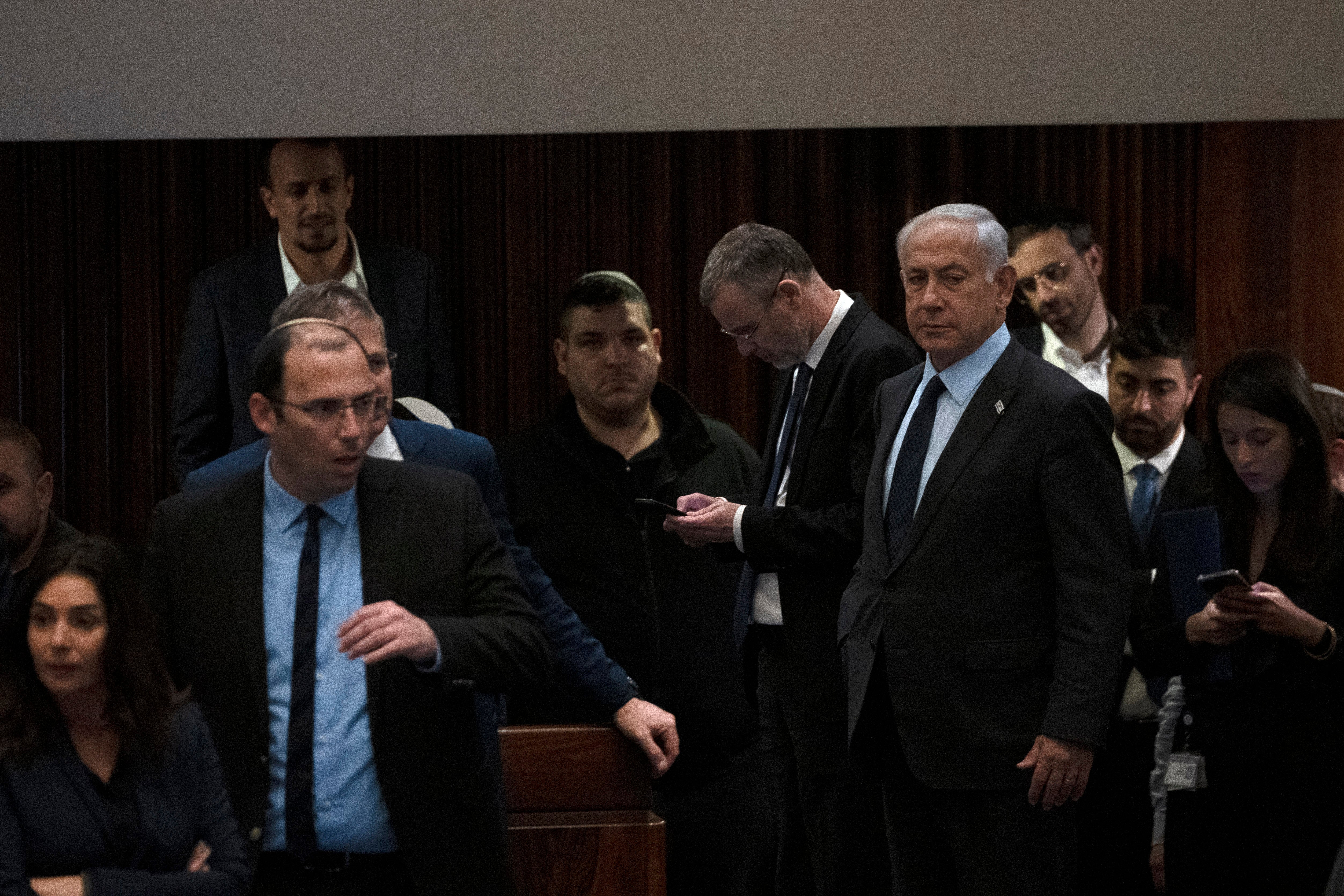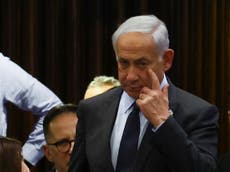Israel protests – news: Far-right groups attack Arabs at pro-Netanyahu march
Protests still raged after Netanyahu’s judicial overhaul postponed
Your support helps us to tell the story
From reproductive rights to climate change to Big Tech, The Independent is on the ground when the story is developing. Whether it's investigating the financials of Elon Musk's pro-Trump PAC or producing our latest documentary, 'The A Word', which shines a light on the American women fighting for reproductive rights, we know how important it is to parse out the facts from the messaging.
At such a critical moment in US history, we need reporters on the ground. Your donation allows us to keep sending journalists to speak to both sides of the story.
The Independent is trusted by Americans across the entire political spectrum. And unlike many other quality news outlets, we choose not to lock Americans out of our reporting and analysis with paywalls. We believe quality journalism should be available to everyone, paid for by those who can afford it.
Your support makes all the difference.Three arrests were made after far-right groups attacked Arabs during pro-government protests in Israel, as Benjamin Netanyahu delayed an incendiary power grab which would see politicians given a greater say in the courts.
Police said dozens of members of the extremist right-wing La Familia group were filmed attacking several Arabs in Jerusalem, in one case “savagely” beating a taxi driver and causing damage to his car.
Monday night saw clashes between opposing groups of protesters, who were out in their thousands on the streets of Israel’s major cities for a second night despite the prime minister’s attempt to diffuse the anger over his proposed judicial reform.
Mr Netanyahu in a prime-time speech on Monday night acknowledged the divisions roiling the nation and announced a monthlong delay for the legislation, saying he wanted “to avoid civil war” and seek a compromise with political opponents.
Opposition parties have started building teams to negotiate an alternative to the ruling right-wing coalition’s reforms, which would give Mr Netanyahu, who is on trial on corruption charges, and his allies the final say in appointing the nation’s judges, among other measures which critics say will weaken Israel’s system of checks and balances.
Netanyahu suspends judicial overhaul after day of Israeli turmoil
Prime minister Benjamin Netanyahu paused his signature plan to overhaul Israel’s judiciary after a day of nationwide turmoil when workers joined a general strike against the proposal and hundreds of thousands of protesters took to the streets.
The plans by his nationalist religious coalition to hand control over judicial appointments to the executive while giving parliament the power to overturn Supreme Court rulings has ignited one of the biggest internal crises in Israeli history.
Announcing his decision late on Monday to suspend the plans until parliament returns after the break for the Passover holiday and Independence Day next month, Mr Netanyahu said the crisis required all sides to act responsibly.
“Israeli society is on a dangerous collision course. We are in the midst of a crisis that is endangering the basic unity between us,” he said in a prime time television address.
We are pausing updates for now. Thank you for tuning in.
Why are there protests in Israel?
Chanting “the country is on fire”, demonstrators gathered outside Mr Netanyahu’s residence in Jerusalem on Sunday evening to demand the draft legislation be withdrawn, only to be dispersed by police water cannons.
Bonfires were meanwhile lit along Tel Aviv’s biggest motorway, forcing road closures and causing traffic mayhem.
On Monday, the protests continued, while Israel’s largest union, Histadrut, which represents 700,000 workers across a huge variety of professions, called for an immediate general strike.
Universities have closed their doors “until further notice” and flights from Tel Aviv’s Ben Gurion airport have been grounded, as pressure grows to halt the legislation.

Why are there protests in Israel?
Benjamin Netanyahu’s plans to overhaul judicial system have attracted weeks of demonstrations
Is it safe to travel to Israel?
In case you missed it...
Tens of thousands of people have taken to the streets across Israel in a unified show of strength in protest against prime minister Benjamin Netanyahu.
Since the start of 2023, weekly protests have been held in opposition to Mr Netanyahu’s controversial plans to overhaul the judiciary.
Protestors have called on the reforms to be scrapped and for the prime minister to resign. On Sunday (26 March), however, Mr Netanyahu fired his defence minister after the former army general echoed the protestors’ calls to bring proposed reforms to a halt, prompting international concern.
In response, protests have escalated, with Israel’s largest trade union launching a general cross-sector strike involving more than 700,000 workers in health, banking and transport.

Is it safe to travel to Israel? Latest travel news
The country has seen weeks of protests in response to plans for a judicial overhaul
Sixty-three per cent of Israelis oppose ousting of defence chief
An opinion poll by top-rated Channel 12 TV found that 63% of Israelis - and 58% of Likud voters - opposed the ousting of Yoav Gallant. Similar majorities supported Netanyahu pausing the reforms.
But with 68% of Israelis faulting him for the crisis, Channel 12 found that, were an election held today, Netanyahu and coalition allies would lose. Two of those parties, Religious Zionism and Jewish Power, voiced misgiving at the reform pause.
Jewish Power’s leader, National Security Minister Itamar Ben-Gvir, said Netanyahu had assured him that if compromise talks over the Passover festival and other national holidays in April fail, the coalition would pursue the reforms unilaterally.
In parliament, the coalition on Tuesday tabled for final readings a key bill that would give Netanyahu greater control of the system for selecting judges. A parliamentary spokesperson called this a technicality. Asked how soon the coalition could call a ratification vote, he said: “In theory, the day after.”
There were charges of bad faith from the opposition, which has already named a negotiating team for the compromise talks.
“A gun is being held to our heads,” tweeted former finance minister Avigdor Liberman. He accused Netanyahu of using the pause in the judicial overhaul to deplete the anti-government protests, and urged fellow opposition leaders to withdraw their negotiators until the judges’ bill is withdrawn from the plenum.
Likud has yet to say who would represent the coalition in the talks. There was no immediate word from President Isaac Herzog, the host of the negotiations, on when they might begin.
While Israeli streets were mostly quiet on Tuesday, some of the tens of thousands of Israelis who have held escalating protests against the judicial overhaul said they would return.
“I will continue protesting until these reforms are completely dropped, because this isn’t a set of reforms, this is a coup by the executive,” said Eitan Kahana, a 27-year-old demonstrator in Jerusalem.
Critics say the judicial overhaul threatens the independence of the courts. Netanyahu, who is on trial on corruption charges he denies, said the reforms balance out branches of government.
Israel's 'fired' defence chief hangs on as Netanyahu hits pause
The Israeli defence chief whose dismissal by Prime Minister Benjamin Netanyahu brought the country’s political crisis to a climax is remaining in office until further notice, aides said on Tuesday, suggesting government indecision on how to proceed.
Beset by unprecedented nationwide protests at his nationalist-religious coalition’s signature plan to overhaul the judiciary, Netanyahu on Monday pressed the pause button and called for compromise talks with the centre-left opposition.
“We are in the midst of a crisis that is endangering the basic unity between us,” he said in a prime-time television address. “This crisis necessitates that we all conduct ourselves responsibly.”
His move stabilised Israel‘s shaken economy. But questions remained about Netanyahu’s credibility - including within his own camp - after dissent by some senior Likud party colleagues.
Among these was Defence Minister Yoav Gallant, who on Saturday broke rank by openly calling for a halt to the overhaul in the name of preventing anti-reform protests from spreading in the military. A day later, Netanyahu said he was firing Gallant.
Ordinarily, that termination would have gone into effect on Tuesday. But Gallant aides said he never got the notification letter formally required to begin the 48-hour countdown to his removal from office, and was continuing to work indefinitely.
Asked whether Gallant was being kept on or replaced, spokespeople for Netanyahu and Likud had no immediate comment.

Former Israeli ambassador to UK defends Netanyahu
Former Israeli ambassador to the UK Mark Regev has defended Benjamin Netanyahu’s judicial overhaul proposal, arguing that it was part of the government’s agenda when the prime minister was re-elected last year.
Speaking about the mass protests against the controversial reforms, Mr Regev told BBC Radio 4’s Today programme: “There were tens of thousands, maybe even hundreds of thousands of demonstrators on the street (in Israel), but there was a poll taken, and that was the Israeli election on November 1.
“This government was elected with a majority and judicial reform was part of its agenda.
“Even people who voted for the government support the idea that this be done in a less confrontational manner, that this be done through consensus.
“I think there’s support on both sides of the legal divide for this process of dialogue, which I hope will succeed, but I’m not sure it will.”
He added: “All coalition governments involve compromises, and I’m sure Netanyahu from his perspective, didn’t get re-elected prime minister to see other people dominate the agenda.”
Ex-Israeli ambassador defends Netanyahu’s reforms
Former Israeli ambassador to the UK Mark Regev has defended Benjamin Netanyahu’s judicial overhaul proposal, arguing that it was part of the government’s agenda when the prime minister was re-elected last year.
Speaking about the mass protests against the controversial reforms, Mr Regev told BBC Radio 4’s Today programme: “There were tens of thousands, maybe even hundreds of thousands of demonstrators on the street [in Israel], but there was a poll taken, and that was the Israeli election on 1 November.
“This government was elected with a majority and judicial reform was part of its agenda. Even people who voted for the government support the idea that this be done in a less confrontational manner, that this be done through consensus.
“I think there’s support on both sides of the legal divide for this process of dialogue, which I hope will succeed, but I’m not sure it will.”
He added: “All coalition governments involve compromises, and I’m sure Netanyahu from his perspective, didn’t get re-elected prime minister to see other people dominate the agenda.”
Far-right Israeli groups attack Arabs at pro-Netanyahu protests
Far-right groups attacked Arab passersby during pro-government demonstrations in Jerusalem, in one case “savagely” beating a man, police said this morning.
Three people were arrested for the assault which came as opposing protesters for and against a proposed judicial overhaul clashed across Israel’s major cities.
Among thousands of pro-overhaul protesters in Jerusalem were dozens of members of the extremist right-wing La Familia group, who were filmed attacking several Arabs, police said.
In one incident, police said an Arab taxi driver was surrounded by protesters who hurled objects at his vehicle and banged on his window.
The driver tried to flee via a nearby gas station, but was then “savagely attacked by the rioters who chased him and caused heavy damage to his car,” police said in a statement.
US hails Netanyahu’s delay to reforms
The US welcomes the decision on Monday by Israeli prime minister Benjamin Netanyahu to delay a decision on plans for a judicial overhaul until next month, White House spokesperson Karine Jean-Pierre said.
The administration is urging Israeli leaders to find a compromise as soon as possible, Ms Jean-Pierre said.
“We welcome this announcement as an opportunity to create additional time and space for compromise,” she said. “A compromise is precisely what we have been calling for.”
“Democratic societies are strengthened by checks and balances, and fundamental changes to a democratic system should be pursued with the broadest possible base of popular support,” she added.
Subscribe to Independent Premium to bookmark this article
Want to bookmark your favourite articles and stories to read or reference later? Start your Independent Premium subscription today.





Join our commenting forum
Join thought-provoking conversations, follow other Independent readers and see their replies
Comments